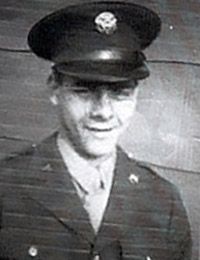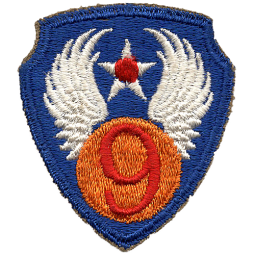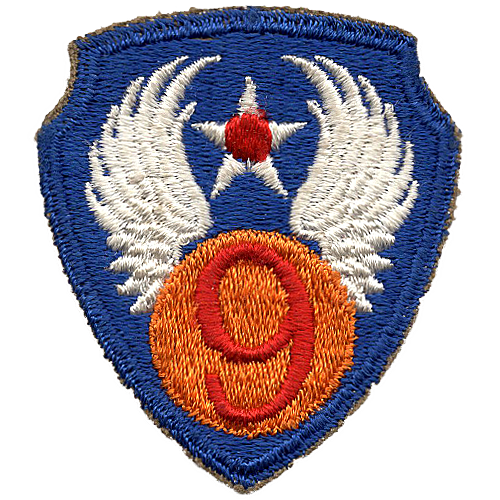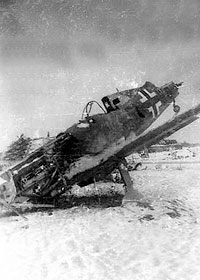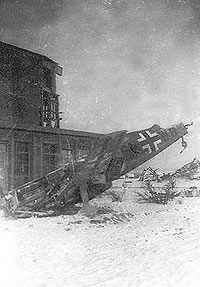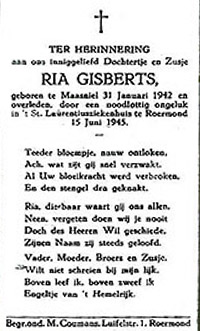My name is Howard Andrew Ellis and I was a 17-year-old living in St. Louis, Missouri, U.S.A. when I quit school and enlisted in the United States Army Air Corps. By the way, though, just for the record, I was born in New York City. Of course I had to lie about my age since 18 was the legal enlistment minimum in those days if you didn't have parental permission. My widowed mom refused to give up her only child so I just told the recruiting sergeant that Oct. 24, 1942 (COINCIDENTALLY THAT VERY DAY) was my 18th birthday...which actually was pending a little more than two months later...Jan. 15, 1943. He congratulated me and started processing me in.
The closest I came to being rejected was that I was actually sort of lame and wore a steel brace on my right leg...which could have rendered me unfit for military service (the reason the Marine Corps and the Navy turned me down earlier). But I got smart, took the brace off and tossed it in the back of my closet in my room at home, and showed up at the army as hale and hearty...Oh, there was one more hurdle...when I reported for my physical in the auditorium of the Recruiting Station I faced about 300 naked guys all lined up for the usual medical probes and urine contributions.
A medic handed me a cup and said "fill it" kid!! But I'd never "done that" in front of so many naked guys not even in the gymnasium shower room at my high school...I was rendered bashful, embarrassed and, urinally speaking, impotent. There I was in the front row of all those bare-ass guys in ages from what to the 40s and it sort of delayed things. But a guy standing at my right pitied me and said, "I've got more than I need" and he filled my cup for me...you could say his cup runneth over. Anyhow, it was a good thing he was healthy or I might never have been able to enlist that day.
SO, from recruit status as a private at Jefferson Barracks on Oct. 24, 1942 to the boarding of the RMS Aquitainia, a british liner converted to a troopship, on Aug. 3, 1943, I did the usual training at posts and bases in such U.S.A. states as Missouri, Arizona, Louisiana and Mississippi. Basically, we trained for jungle warfare in the Pacific. So it was no surprise that, as a now 18-year-old sergeant, a Signal Corps communications cryptographer/technician, I was assigned in the 1074th Signal Service Company - commanded by 2d Lt. Robert Scott Gruhn - at Camp Shanks, New York, and we were bound for a most un-junglelike destination, ENGLAND.
Once in Great Britain, we arrived at Gourock, Scotland, on Aug. 12, 1943 after eight uneventful days at sea...no enemy subs in sight...the 1074th was assigned to an 8th AAF post at Reading, England...a few months later I was transferred to 8th Air Support Command where I was assigned to the Cryptographic/Code Division at an old estate, Sunninghill Manor near Ascot. From there I was eventually assigned to the 877th Signal Service Company, 16th Air Depot Group, 6th Tactical Air Depot. Our company was commanded by Major Joseph A. Plihal. My division supervisor was a 2d Lt. Charles Robert Cross from Long Island, N.Y. Of all the guys in 877th, he's the only one I'm still in contact with after all these years. You know, he's about 86 now and I'm 79, tempus fidgets.
Well, the 877th, assigned to the 9th Air Force Support Command, trained for the eventual D-Day venture which finally began on June 6, 1944. But, only a detachment of eight of our guys, led by a Lt. Heinie (of all things) got to go on that great and bloody adventure. The rest of our company continued soldiering at our base near Swindon until the first week of July when we were trucked to Southhampton, England, to board a troopship called the "Llangley Castle" and during the night of July 13, '44 we sailed for France, for Omaha Beach, where we arrived sometime on July 14, 1944. Dramatically, we got to disembark via rope ladders to landing craft below manned by British sailors...who took us to the beach...but it was NO D-Day...it was so calm and safe we could have been tourists arriving for a reality tour...even though the real war was just a couple miles ahead of us. We climbed the cliff with our carbine rifles and other gear and camped just out of sight of the channel...for a week. At night we could hear our tank forces and supply vehicles grinding east toward whatever lay between occupied St. Lo and Paris. The only Germans we saw aside from prisoners of war were the nightime overflights of Luftwaffe observation planes we labeled "Bedcheck Charlies".
Oh, I must tell you. When we debarked at Omaha Beach and ascended the cliff route to the plateau, it was Bastille Day, France's "Fourth of July"...and as we approached the crest this French lad, about 12 years old, leaned over and shouted down to us in his version of English, "Welcome to France Yankee Mother F.....rs..." When we got to the top and picked him up by the neck he explained that paratroopers who actually came there on D-Day taught him to say those words and convinced him it was a traditional American greeting. We loaded him with foodstuffs, candy and gum and sent him on his way.
When Paris and northeastern France were liberated in August and September, the 877th was moved to the old LaFayette Escadrille base at Rheims, France where we stayed safely and without dramatics even through the Battle of the Bulge. As I recall, no one in my outfit ever got shot at, our casualties were from too much liquor, from vehicle accidents or angry fathers chasing us away from their daughters. I think Sgt. Bill Mauldin put it best in a cartoon showing Willie and Joe, battle-weary veterans, looking at a couple neatly uniformed military clerks and commenting, "they're too far back to get shot at and too far forward to wear ties..."
In April, '45, the war was doing so well I actually got a furlough to England and I reverse-invaded London for a week then back to Normandy for a few restful days at a resort town on the coast...and on to Paris for a week. There, one morning I left the hostel hotel to take in the sights...only to be stopped on the streets by crying Parisians who told me President Roosevelt was dead. I was with a couple of my buddies and we went to the Cathedral of Notre Dame where a priest was adorning the huge front doors with purple ribbons...mourning. Back at our hotel, the Hotel Meridional on the Rue Richard Lenoir near the Place de la Bastille, a courier notified us our outfit had moved to recently occupied Monchengladbach, Germany and we headed back for duty. It was April 12, 1945. There we stayed through the end of the war, V-E Day.
The very first night of D-Day, my buddy Cpl. Jerry Lorenz from Passaic, New Jersey, and I left the communications section after dark and headed across a field to the recreation center...of course it was about 8 p.m. and dark except for moonlight. All of a sudden the whole field, the whole place, was engulfed in lights and sirens were screaming...thinking it was an air raid we fell to the ground and covered our heads as we attempted to press ourselves into the dirt...waiting for bullets or bombs...BUT it was only that for the first time since the friggin' war began, everybody in Europe, even Germany, was turning on their lights at night so our commander, Colonel Hoffeditz told the guys, "turn on the goddam lights..." and they did. Jerry Lorenz and I stood up and just stared in awe, like kids seeing their first lit Christmas Tree...and then we stood there and cried like babies and we hugged each other, regained our composure and went on to our beers at the Rec Center. what was it? May 8, 1945? Our outfit returned to the States in July 1945 and I was actually in New York City, eating lunch in a Chinese Restaurant on Times Square in town when the sign on the Times Building spelled out "President Truman announces Japan's unconditional surrender".
I was with an old family friend, Rhoda Chase, mother of a childhood friend, when that happened and she went to the bar, bought me a bottle of whiskey and told me, "Get the Hell out of here and soak this up boy, this is no time to be chowing down with an old bag from Brooklyn." Bless her heart. I did go out, celebrated, got drunk and the next morning flew home, then to our new base in Laredo, Texas, where on Oct. 16, 1945, I received my discharge from World War II.
Of course, after a couple jobs including one in the Pentagon Building in Washington, D,.C., I re-enlisted in 1947 and just stayed in the military until I retired as a master sergeant journalist specialist in 1965. I then worked as a reporter etc., at a San Bernardino, California, newspaper until my second retirement in February 1990. I've got a German wife I met in Berlin in 1949 during the airlift days, we've got five offspring with German-American DNA, and one of our sons married a wonderful Japanese girl while he was there with the Navy and they've got a couple sons with Japanese-American DNA. PEOPLE, my war is over...I've made my peace. God Bless You All, God Bless Us Everyone.
"DOC" ELLIS
